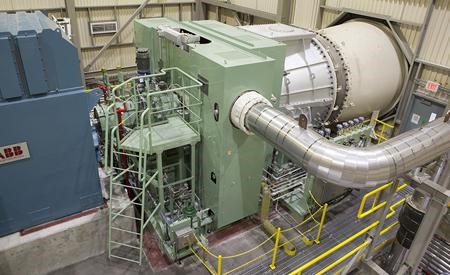A new power generator bought by Catalyst Paper Corporation will save the company nearly $5 million annually and bring one of Powell River’s biggest employers one step closer towards longterm sustainability.
Catalyst brought power generator G13 online at the beginning of November and held its official opening on Wednesday, November 25, with a number of representatives from BC Hydro, the City of Powell River and government.
“This is a major accomplishment for the Powell River mill,” stated Joe Nemeth, Catalyst chief executive officer, in his opening speech. “It reaffirms Catalyst’s commitment to both environmental stewardship and economic sustainability.”
G13 converts low-pressure waste steam into 11 megawatts of electricity and will reduce the operation’s hydro bill by $4.7 million annually.
Fred Chinn, Powell River operations manager, welcomed Nemeth and other Catalyst executives, Jeffrey Seto and Kevin Wallace from BC Hydro, City of Powell River mayor Dave Formosa and councillor CaroleAnn Leishman, MLA Nicholas Simons and MP Rachel Blaney to the opening.
“It’s wonderful that they are using the product that otherwise would just be going out into the world and is now generating power and saving millions of dollars in power cost every year,” said Blaney.
Blaney added this project is an example of how Canadian companies can work toward benefiting the economy and the environment.
“It’s important that it’s no longer a conversation about the economy or the environment,” she said. “It’s how those two things work together to the benefit of both. It’s exciting that Powell River is one of the communities that is leading the way to make that a reality.”
The two-year, $25-million project was developed in partnership with BC Hydro and generates enough power to meet the needs of all the households and businesses on the Upper Sunshine Coast, said Chinn.
“This is textbook example of green power,” said Chinn. “We’re generating electricity out of something that existed already and not adding anything.”
According to Chinn, the Powell River mill machines use high-pressure steam generated by burning tree bark. As the steam goes through the machines, it loses pressure.
“We had all this low-pressure steam condensing,” he said. ”We weren’t doing anything with all that low pressure and now it goes through this turbine and generates 10 to 11 megawatts of electricity.”
G13 will lower the amount of power the company purchases from BC Hydro. The new generator will increase the amount of power it is able to sell back to the BC Hydro grid throughout the year.
“We see the power generation as vital to our longterm future in this mill,” said Chinn. “Power prices will always only go up and you need power to run the mill.”
Chinn said that power generation has become one of Powell River operation’s three main business units. The mill continues to produce glossy, supercalendered paper on Paper Machine 10 and high-grade product on Paper Machine 11.
“This is another key element in giving us a future, but it does not itself do it,” he said.
To give the mill longterm sustainability the company will need to find other paper products that it can make using the machines, he added.
Despite the savings in power costs, Catalyst is still battling the US Department of Commerce’s decision to impose 18 per cent countervailing duties on its supercalendared product, a cost that adds $16 million in annual operating expenses to Powell River, said Chinn.
The company has a lot of government support from the federal and provincial governments who are lobbying the US Department of Commerce to revisit their decision, said Chinn.



